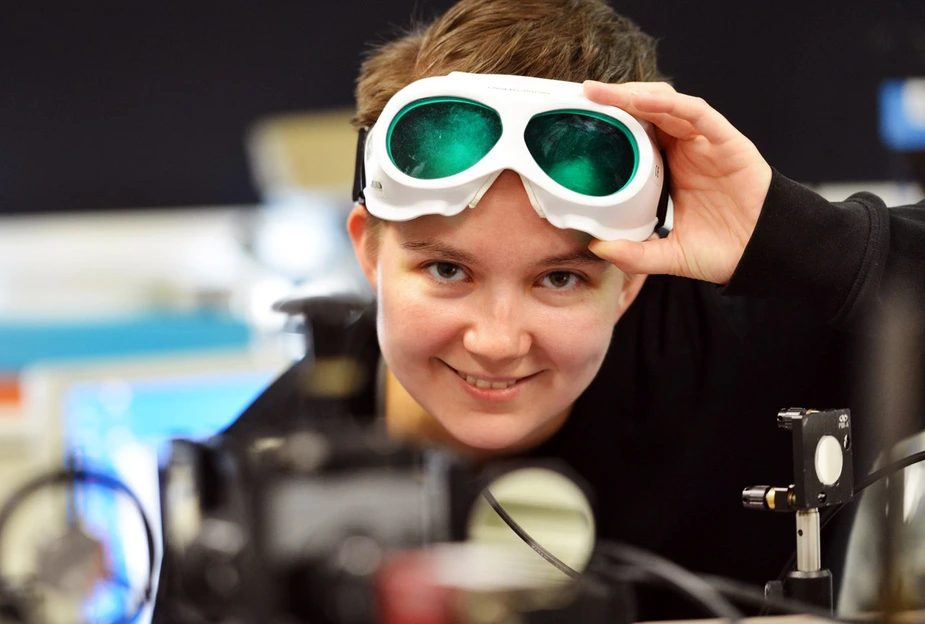Living in the Laboratory
The Max-Born-Institute secures future physics lab technicians
How curiosity, love of experimentation and meticulousness are helping Josefin Fuchs to complete her apprenticeship as a physics lab technician at the Max-Born-Institute.
Josefin Fuchs loves physics. “I was already a bit of an oddball in 9th grade,” she says. It is not the most popular subject among girls of that age. What’s so great about physics? “Physics is logical” is her spontaneous answer. The amicable 27-year-old is a prospective physics lab technician at the Max Born Institute for Nonlinear Optics and Short Pulse Spectroscopy (MBI) in Adlershof. Her final year of training begins in September. The lab has basically become her second home. When she’s not in a course at vocational school, she puts on her safety goggles to set up, conduct and evaluate experiments. Her apprenticeship offers a vast range of topics. She has dabbled in chemistry, metal processing, vacuum, technical drawing, laser experiments and electrical engineering. She travels around a lot because the practical part of her apprenticeship takes place in various locations. The MBI cooperates with the bbz Vocational Training Centre for Chemistry and companies like, for example, the FMB, a company for precision engineering and measurement technology company. Her curriculum also includes a microcontroller technology internship at the Helmholtz-Centre in Berlin Wannsee.
“I enjoy most things if they just work,” says Josefin. Enthusiastically, she tells us how it took two days to produce a cylindrical coil from an oblong chunk of metal. She also recalls having to identify the wavelengths of a spectral lamp. This requires many individual measurements. Regina Lendt, the apprenticeship commissioner at MBI, praises Josefin for her self-reliance and adds that patience and taking good care are indispensable for working in a laboratory.
“Josefin is the eighth woman to do her apprenticeship with us,” says Lendt happily, a long-standing lab technician herself. While one fifth of the MBI staff are women, the institute does not yet have a top-level female scientist. The MBI has been training two physics lab technicians every two years since 1995. Theoretically, the requirement to become an apprentice is an intermediate-level school diploma. “In practice, however, only high-school graduates or college dropouts are able to get through our recruitment test,” says Regina Lendt and goes on commenting on the decreasing education level of applicants.
Unfortunately, a penchant for experiments is not enough. The requirements include basic 9th grade skills in mathematics such as taking square roots and solving logarithmic equations and exponentials. Most applicants dislike chemistry. English skills are also important since people from 23 nations work at the MBI. The institute focuses on basic research and has built a worldwide reputation for researching chemical and physical processes with ultra-short laser beams.
Josefin is also a college dropout. Equipped with advanced knowledge in mathematics and physics, it seemed logical to study physics after graduating from high school. She studied for seven semesters at the Technical University Berlin before she put an end to it. “It was just too theoretical.” What then? “I knew exactly I wanted to do something involving physics,” she says. She considered an apprenticeship as a physics lab technician or an aircraft mechanic. She decided for the former, the job at the MBI. Growing up in nearby Bohnsdorf, Josefin knew Adlershof because she drove past it many times. One can feel that she enjoys working at the MBI.
Lendt is optimistic that she will recruit two more women this year. She has already reviewed the applications and is now interviewing applicants. Overall, the number of applications is declining. To secure prospective apprentices in the future, the MBI has approached several schools. Josefin does not worry about the future. Following her apprenticeship, she plans to acquire the additional PTA qualification, physical-technical assistant, and to go on an exchange semester in France. If the MBI cannot offer her a laboratory job after graduation, she has a great chance of starting at one of the MBI’s cooperation partners. “Our apprentices are in high demand,” says Regina Lendt proudly and mentions that the MBI has produced many prize-winners of the annual apprenticeship award. Berlin only has a few businesses left, who trained physics laboratory assistants. The MBI is one of them.
By Sylvia Nitschke for Adlershof Journal
